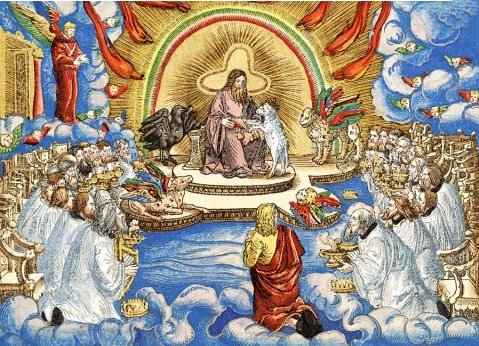![]() This post is a letter to a young friend of mine who caught me by surprise with this social media post:
This post is a letter to a young friend of mine who caught me by surprise with this social media post:
I am now an Eastern Orthodox Christian. I renounce unitarianism and embrace the Nicene Creed, confessing that Jesus Christ is true God of true God and of one essence with the Father, as is the Holy Spirit. I repent of every false belief I once held and ask God to forgive me for blaspheming the adorable and consubstantial Trinity.
I find it disturbing, my friend, that you think you may have “blasphemed” in holding to biblical unitarian views. But rather than ask you about that, let me comment on your later post where you explained, on a biblical level, what pointed you to converting to Orthodoxy, which you’re already starting the process of.
John 1:1 & John 20:28 clearly—and I do not use that word lightly—display the divinity of Christ. Calling a creature your God is blasphemous and senseless.
Before we agree whether or not this is “clear,” let’s ask what is meant by “divinity.” Does this quality entail being the one God himself? It’s clear from what he says below that he would say No. So then, in his view, to have the quality divinity is to be a god (just by definition), but not necessarily the unique God. Is that clear? Does those passages clearly teach Jesus to be a god other than the one true God? I would argue not. John 1 doesn’t say that the Logos is the same being as the man Jesus. It says it “is God” but I take it this is the same god as mentioned the first time. And it is plausible to take Thomas in John 20:28 as acknowledging both God and the Son of God. That is reading with 1st c. concepts, not with 4th. (More on that here.)
I really don’t know about Titus 2:13 and 2 Peter 1:1. There are good reasons to doubt both identify Christ as God. In Titus, Christ could simply be “the glory of” our great God and Savior (i.e., the Father). In 2 Peter, the definite article preceding “Savior” may have been dropped out because it’s the introduction of an epistle—a very common practice in the New Testament. I still doubt Romans 9:5 calls Jesus God.
Right. Note that if they identify Christ and God, they would thereby identify God and Christ. Numerical identity is (among other things) a symmetrical relation.
In any case, keep in mind that in the Bible, someone can be addressed as “God” even though they are under God. E.g. Hebrews 1:9. This idea that the title implies having a divine nature is a later idea.
Philippians 2:6-8 pretty clearly describes the incarnation of a divine being.
I disagree, for a number of reasons.
 Colossians 1:16-17 indicates Christ is the one in whom, through whom, and for whom absolutely everything exists, which is utterly impossible to be true of someone who is a creature; God, whose name is Jealous, made the world for His own glory.
Colossians 1:16-17 indicates Christ is the one in whom, through whom, and for whom absolutely everything exists, which is utterly impossible to be true of someone who is a creature; God, whose name is Jealous, made the world for His own glory.
“God” in this last sentence meaning who? In any case, note the new covenant context of the passage – Colossians 1:18-23. I would argue that it should be read as involving Paul’s idea of a “new creation” accomplished by Jesus. There are some strong general reasons to favor that reading, even aside from the passage. One of these is that in all clear passages, creation is ascribed to God, i.e. to the Father, and we don’t see in the NT the Platonic idea that God somehow can’t interact directly with his creation.
If you’re not meaning to say here that Jesus created the cosmos, but only that the cosmos was made for him, with him in mind, so that he can rule it under God (1 Corinthians 11:3, 1 Corinthians 15:27-28), then I don’t see why a creature couldn’t have that honor, specifically, a human Messiah.
 Revelation 5 depicts Christ receiving equal worship with God the Father, which doesn’t make sense if he isn’t “true God of true God” (as the Nicene Creed puts it).
Revelation 5 depicts Christ receiving equal worship with God the Father, which doesn’t make sense if he isn’t “true God of true God” (as the Nicene Creed puts it).
I take it being “true God” here means having the divine nature, being one nature/essence with the Father. But note that scripture nowhere says that this is the justification for our worshiping Jesus. (They would not want to say that he’s a god in addition to the only god. Nor do they have the idea of a “divine Person” who is somehow within the one God, the Trinity.) The NT reason for worshiping Jesus is plain on the surface of Revelation 5:9-10, as it is in Philippians 2:8-9.
Later in the same book, Christians are described as priests of Jesus Christ, and if you’re a priest of someone, that person is your God to whom you render cultic devotion and sacred service. If someone offered that to anyone other than YHWH in the days of King David, that person would be considered an idolater.
It is not true that by definition, if you’re a “priest of” someone, then that someone is your God. Yes, it does say that believers will be priests “of God and Christ.” (Revelation 20:6) It usually says that we’re priests of God. (Revelation 1:6, Revelation 5:10) But these are consistent claims. In the NT there is the one God, but there is also the one Lord (1 Corinthians 8:4-6), and we serve both. A priest is like an intermediary, who goes between people and a god – or, arguably, the unique Lord under that God. As John says, ” truly our fellowship is with the Father and with his Son Jesus Christ” (1 John 1:3). We have the privilege of bringing others into that fellowship. I don’t see any difficulty here for biblical unitarian views.
I’m also convinced Christ is the Alpha and the Omega, the First and the Last, the Beginning and the End based on Revelation 22:13. Revelation 1:8 & 21:6 are almost certainly God the Father, which shows that it’s a title of divinity and absolute preeminence; if Jesus shares that title as well, then to him belong all the honor and worship associated with that status, which is precisely what we see in the book of Revelation (especially 5:13-14).
This is a stretch, to argue that Jesus is truly called “the Alpha and the Omega,” thus he is divine in the sense the one God is divine, where one has “absolute preeminence.” About Revelation 5, contrast the stated reasons for Jesus’s worship (Revelation 5:9-12) with the reasons cited for worshiping God (Revelation 4:8,11)
The explanation I used to give for Revelation 1:17 & 2:8, that Christ is “the first and the last” because he’s the first and last to be raised from the dead, was a terrible argument in retrospect that clearly revealed my biases. Arianism initially sounds reasonable, but falls flat because Jesus is ultimately a creature under this model, which does not sufficiently account for the fact that he is our God (John 20:28), who was in the beginning with God and was God (John 1:1), and is the one for whose sake everything exists (Colossians 1:16).
Not sure what he means by “Arianism” here… All I have to say about this end part is, it is putting too much weight on three passages which are less than fully clear.
 Whatever the case may be, however, it is clear from the Scriptures that God is not Jesus. They’re clearly portrayed as two distinct entities from one end of the New Testament to the other, especially in Paul. Even in John, which placards the glory and majesty of Christ in a way not found elsewhere in the New Testament, Jesus is still carefully distinguished from God throughout the whole book. John 7:17 is a good example: “If any man will do his will, he shall know of the doctrine, whether it be of God, or whether I speak of myself.” If your will is to do God’s will, you will know that the doctrine Jesus taught came from God, not from himself. Simple logic dictates that God is not Jesus here.
Whatever the case may be, however, it is clear from the Scriptures that God is not Jesus. They’re clearly portrayed as two distinct entities from one end of the New Testament to the other, especially in Paul. Even in John, which placards the glory and majesty of Christ in a way not found elsewhere in the New Testament, Jesus is still carefully distinguished from God throughout the whole book. John 7:17 is a good example: “If any man will do his will, he shall know of the doctrine, whether it be of God, or whether I speak of myself.” If your will is to do God’s will, you will know that the doctrine Jesus taught came from God, not from himself. Simple logic dictates that God is not Jesus here.
The New Testament reveals Jesus Christ as a divine person who is neither an angel nor a demigod, and there are not different grades of divinity in the biblical worldview. However, to conflate God and Jesus is contrary to the New Testament authors’ repeated efforts to distinguish them from one another.
Well said! This is all clear, careful reasoning.
But I would ask my friend what, if anything, he thinks is wrong with this argument:
 1. Jesus and God are two beings (i.e. they are numerically distinct). Premise
1. Jesus and God are two beings (i.e. they are numerically distinct). Premise
2. God is divine (has the essential quality of divinity). Premise
3. Jesus is divine (has the essential quality of divinity). Premise
4. If something has the essential quality divinity, it is a god. Premise
5. Therefore, Jesus is a god. (3,4)
6. Therefore, God is a god. (2, 4)
7. Therefore, there are at least two gods. (1, 5, 6)
We agree, I think, that the NT plainly implies 1 and 2. (Why 1? See here.) 4 is true by definition. But the rest follows, if we also agree with 3.
My friend, do you accept this as a sound argument? If not, why not?
I’ll put my cards on the table. I think the NT does not teach 3; if it did, it would present Jesus as having underived authority, essential omniscience and omnipotence, untemptability, and essential immortality, and as the ultimate object of proper human worship. But again, I would ask my friend for his response to the argument. 3 is the weak link above, and should be denied; thus we can avoid 7.
Jesus is God, but God is not Jesus. This sounds self-contradictory, and it is certainly paradoxical, but I believe there is a solution that will explain this phenomenon.
If both occurrence of “is” in the first sentence here express numerical identity, then that sentence is evidently false, like all sentences of the form: a=b & -(b=a). Again, = is symmetrical. On the other hand, if he’s saying Jesus is divine, and God is numerically distinct from Jesus, the statement is not paradoxical. But when we add in some more premises, there is trouble, as shown in the argument above.
The only doctrine of God that incorporates all these seemingly disparate data is the Monarchy of God the Father.
Well, that’s a bit hasty! But let’s explore the hypothesis, and see how it fares.
There is one God, the Father Almighty, who eternally begets a Son and spirates a Spirit who are absolutely equal with Him in divinity, glory, and eternity.
Once we get past the first seven words, this is, in my view (and in the view of many scholars) not taught in the NT. We are now squarely in the realm of post-Origen catholic theorizing. Do you disagree? Do you hold that eternal generation and spiration are taught in scripture? If so, where? If not, why put so much weight on these speculative traditions?
The Son and Spirit are therefore truly God, but they are not the one God from whom are all things.
I take it that being “truly God” means having the essential quality divinity. Thus, each is a god. So this scheme has a unique God who eternally causes two other gods, which are nonetheless (it is claimed) just as divine as he is.
Comment: then independence or aseity is not entailed by divinity. To me, this is a significant theological price to pay. We should want to deny that being fully divine is compatible with existing because of another being.
They derive their being and attributes from God the Father through two eternal processes unique to each (i.e., begottenness and spiration), and are not “the one God” in the monotheistic sense.
In other words, they are not “God” in the highest use of that word, the use reserved for the unique God Yahweh/the Father.
Whenever a cardinal number is associated with “God” in the New Testament, which signifies the biblical author is about to make a monotheistic statement, it always describes the Father, not the Trinity. The Father is the only true God (John 17:3), there is one God and Father of all (Ephesians 4:6), and for us there is one God, the Father (1 Corinthians 8:6).
Well said! That is why I would call this view a variety of unitarian theology, and not trinitarian. On this theology there is no triune/tripersonal god. I would suggest you ask around your Orthodox church, find out how many would agree that there is no triune God. Please let me know what you find out. (We can argue definitions another time.)
Yet the apostles do not speak of God apart from His Son and Spirit, and they continually invoke all three in their doxologies, blessings, and prayers.
If the first statement means that they never speak of God without mentioning the others, that is false. Both OT and NT do it frequently. If on the other hand it means that biblical authors talk not only of God, but also about his spirit and about his unique Son, that’s true – but in a sense, trivial. Who would deny that?
There are, relevantly, passages wherein the three are mentioned. I have argued that a biblical unitarian shouldn’t be worried by these, as there is a simple explanation for the practice, one which doesn’t imply three divine beings.
It seems to me that my friend is choosing not to pay attention to some facts which don’t fit well with his theory: (1) the Trinity is never an object (or three objects) of worship, (2) the Spirit is never an object of worship, (3) the Son is given his glorious status by God, and (4) God seems to be the ultimate recipient of honor. (Philippians 2:11)
The upshot of this is each person of the Trinity is worthy of the same worship as the other; we do not give one level of worship to the Spirit, a yet higher worship to the Son, and the highest worship of all to the Father, but rather we worship them equally.
Sorry, but this has not been shown. Nor does it fit with the practice we see in the NT, or even within the first 300 years of Christian history. BTW I don’t think the NT really says anything about “levels of worship,” although some unitarian Christians have. I would be wary of any argument that depends on the idea of “levels of worship.” I note that here, you seem to be placing weight on the claim that Jesus deserves the same “level of worship” as God.
The most common form of Trinitarianism found in the West doesn’t work because they believe God is the Trinity, which is not the case in the New Testament. But this is not a denial that the Son and the Spirit are each YHWH; given that Jesus fulfills many things that were prophesied of YHWH in the Old Testament (e.g., “all who call on the name of the Lord will be saved” in Romans 10:9 and “every knee shall bow to me” in Philippians 2:9), it is safe to infer that he is YHWH.
Yikes. Now it sounds like being “divine” or “true God” means being Yahweh himself. But this is just to confuse Jesus with God – which he above disavowed.
This post is getting too long for me to discuss the fulfillment fallacy, but see here and here and here and here. This a new sort of mistake in reading the NT, one which I think was rare in ancient times. In short, the NT writers don’t think Jesus “is YHWH” (whatever that may mean), but rather that in these fulfillments God is acting through Jesus and/or that there is now seen a double meaning, a second fulfillment regarding the NT “Lord” (= the man Jesus).
But the reason they are YHWH and the reason the Father is YHWH are quite different. The Father has shared His divine life with the Son and Spirit and incorporated them into His own identity, while the Son and Spirit receive this status from God the Father.
 Notice that we’re far from the NT or even from ancient catholic theologies here, with this talk of life-sharing and someone one being putting two others into his “identity.” (This, I have carefully argued, is confused and confusing new language.)
Notice that we’re far from the NT or even from ancient catholic theologies here, with this talk of life-sharing and someone one being putting two others into his “identity.” (This, I have carefully argued, is confused and confusing new language.)
The Father’s so-called “Monarchy” (which refers to a priority in causation, not a priority in honor or glory or worship) is why He is called “God” by way of preeminence—if that is an appropriate word to use—throughout the New Testament.
Again, this is simply not taught anywhere in the NT. I would ask my friend where he thinks it is.
Again, this is a preeminence only in the sense that He is the source and cause of the Godhead;
“Godhead” means divine nature. But I think he means “cause of the Trinity,” that is, of the existence of the triad of gods, of divine beings. I note in passing that probably most who wield the slogan “Monarchy of the Father” mean by that that he explains the unity or the existence of the triune God or why those three “Persons” somehow amount to just one god.
God the Father is the archetype, with the Son and Spirit being perfect images of the original.
I think we all know the passages where the Son is taught to be like the Father, but where is it taught that the Spirit is?
To offer a lower level of worship to the Son and Spirit, or to deny that they are truly God, dishonors the Father and detracts from His glory, because the Son and Spirit are what the Father is and are the only means by which to rightly worship God. If Christ is not truly God, then that means his Father is not truly God, because what Christ is, the Father is. The same is true of the Spirit.
I note that we’re in speculation-land here; these claims are neither self-evident nor are they clearly taught in the NT. But in my friend’s own view, the Father uniquely has a praiseworthy quality, being the source of divine beings/gods. I would ask him, is the Father praiseworthy for this? If yes, the in a sense the Father is being worshiped in a way the others are not. If no – well, I don’t see why one would say that, other than the preserve the notion that the three must get exactly the same kind of worship.
I have not found a more satisfactory solution than this. The Monarchy of God the Father (1) preserves biblical monotheism without compromising the divinity of the Son and Spirit, (2) remains faithful to the apostolic witness concerning God, and (3) guards against the pervasive modalistic tendency in Western Trinitarianism.
I grant 3, although biblical unitarianism does just as well on that score, and without veering into tritheism. About 1, I don’t how the theory succeeds. To be the only god is to be the only divine being (using “divine” in the highest sense). But on this theory, there are three beings divine in that sense. The Father is still unique on this theory, but not because of his divinity! I can’t agree with 2.
 In sum, a few observations. Biblical unitarians have work to do on addressing the canon within the canon, those passages it is tradition to (over) focus on: John 1, Col 1, Phil 2. I think there are compelling reasons not to read these as giving any support to later two nature theories about Jesus. But my friend here has not interacted with any of those arguments here; he holds it to be rather obvious that here we find a pre-existent and fully divine Jesus, creating the cosmos and then incarnating into it. Also, we need to better address worship arguments. I have fully done so here. I wonder where my friend would disagree.
In sum, a few observations. Biblical unitarians have work to do on addressing the canon within the canon, those passages it is tradition to (over) focus on: John 1, Col 1, Phil 2. I think there are compelling reasons not to read these as giving any support to later two nature theories about Jesus. But my friend here has not interacted with any of those arguments here; he holds it to be rather obvious that here we find a pre-existent and fully divine Jesus, creating the cosmos and then incarnating into it. Also, we need to better address worship arguments. I have fully done so here. I wonder where my friend would disagree.
I have to say that I don’t really understand my friend’s decision to convert. I have here addressed only the biblical and theological issues. But I suspect that there are strong non-theological motives in play. In any case, I pray that God will bless and guide him and use him. I will be glad to talk with him, and if given the opportunity, to fellowship with him. I do not think he is blaspheming in any of this, even though I think he is making some errors.
I suspect that he may not be fully aware of the baggage that comes with Orthodoxy, such as the ethnic nature of much of it, what I would call its Christian idolatry based on the 787 council, its authoritarian orientation, and the (truly) trinitarian nature most Orthodox theology. Of course these groups have many good qualities. But to me, giving up completely on Protestantism per se is a big deal. (I wonder if it is for my friend…)
Finally, I invite him to continue the conversation – specifically the argument above, which I think focuses some issues.

I don’t believe myself that the Father is begetting the Son before the incarnation nor that the bible teaches this.
John 1 v 1 teaches as far as I can see that there is no Father Son relationship in the beginning between the Word and God.
No need for metaphysical speculation to construct a theory of generation and spiration.
“One of these is that in all clear passages, creation is ascribed to God, i.e. to the Father, ”
I am just wondering where these passages are that supposedly ascribe creation exclusively to the Father by name. I am not perfect either so I could have overlooked them by mistake.
1 Cor 8 v 6 implies equality of participation and action in creation to the Father and Jesus Christ does it not?
“1. Jesus and God are two beings (i.e. they are numerically distinct). Premise”
If the Word and God are two different beings how can the Word be identified with God in John 1 v 1?
Comments are closed.